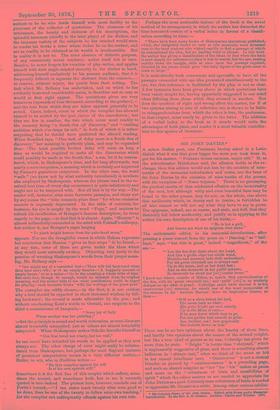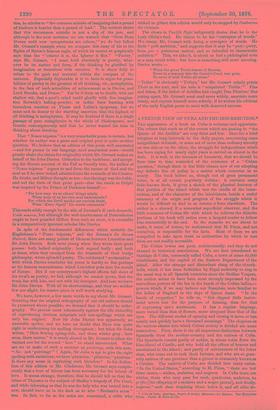SIR JOHN DAVIES.*
A minor Italian poet, one Pontanns, having asked in a Latin, distich what it was that grew bigger the more you took from it, got for his answer, " Pontano demas carmina, major erit." If, a& the schoolmaster Holofernes said, the allusion holds in the ex- change, then this edition would not lose by the excision of nine- tenths of the memorial-introduction and notes, nor the fame of Sir John Davies by the omission of nine-tenths of the poems,
with the exception of " Nosce teipsum.". There is no gainsaying the poetical merits of that celebrated effusion on the immortality of the soul, but although witty and even beautiful lines may be- found in the other poems, they do not, on the whole, rise above that mediocrity which, in theory and in justice, is forbidden to. all who cannot or will not say what they have to say in prose. The epigrams, indeed, are so coarse, and stale, and dull, that they distinctly fall below mediocrity, and justify us in applying to the author his own description of one of his butts,—
" He is but a gull,
And knows not what an epigram does mean."
The enthusiastic editor, in his memorial-introduction, after- praising a queer conceit from the poem on "Dancing," as "bail- liant," says, "but this is great," indeed "magnificent," of the
:—
" 'Lois the Sea that fleets about the Land,
And like a girdle clips her Bolide waist, Musick° and measure both doth understand; For hie great chrystall eye is always cast Up to the moon, and on her fixed fast ; And as she dauneeth in her pallid spheere, So daunceth he about her [sic] center hears."
I know not where, outside of Milton, to match that personification of the Sea, with its 'great chrystall eye,' and palid ' [sic] is as tenderly delicate as the other is grand. Coleridge must have carried it in his omniverous [sic] memory, for surely one of the most memorable of the stanzas in his 'Ancient Mariner' drew its inspiration thence, as, thus:—
" Still as a slave before his lord, The ocean bath no blast ;
His great bright eye most silently Up to the Moon is cast,— If he may know which way to go, For she guides him smooth or grim. See, brother, see I how graciously She looketh down on him."
There can be no two opinions about the beauty of these lines, and hardly two opinions about the source of the second couplet, but like a true thief of genius as he was, Coleridge has given far more than he stole. " Bright " is better than "chrystall," which is unpleasantly suggestive of glass, and there is something almost ludicrous in "always cast," when we think of the moon as hid in her vacant interlunar cave. " Omniverous " is not a clerical blunder, as proved by " omniverousness " in a preceding page, and such an absurd misprint as " her " for " his " makes us pause and muse on the "robustness of brain and sensibilities of spirit" which the editor assures us are needed to appreciate Sir John Davies as a poet. Certainly some robustness of brain is needed to appreciate Mr. Grosart as a critic. Among other curious ideal- • The complete Poona s/ Sir John Dories. Edited, with Notes, and a Misserlall. Introduction. By the Rev. A. B. Oman. London ; Ohatto and Windne. 11376.
lies, he alludes to "the common mistake of imagining that a pound
-of feathers is heavier than a pound of lead." The context shows that this uncommon mistake is not a slip of the pen, and
although in the next sentence we are warned that "from Dean Donne until now 'comparisons are odious," we do but follow Mr. Grosarta example when we compare this essay of his to the flights of Byron's famous eagle, of which its master so graphically
says that the " 'otterer it is, the 'igherer it flies." "Poetry," says Mr. Grosart, "I must hold absolutely is poetry, what- ever be its matter and form, if the thinking be glorified by
Imagination or tremulous with emotion. It is sheer folly to
refuse to the p_oet any material within the compass of the universe. Especially deplorable is it to have to argue for possi-
bilities of poetry in the greatest of all thinking, viz., metaphysics, in the face of such actualities of achievement as in Davies, and Lord Brooke, and Donne." Far be it from us to doubt, with our shallow wit, that a poet's mind could glorify with fine imagina- tion Borwick's baking-powder, or indite lines burning with
tremulous emotion on Piesse and Lubin's opoponax, but we must and do demur to the startling assertion that the highest of All thinking is metaphysics. It may be doubted if there is a single ,passage of pure metaphysics in the whole of Shakespeare, and
Goethe contemptuously said that he never wasted his time in thinking about thinking.
That " Nosce teipsum " is a very remarkable poem is certain, but whether its author was a great and original poet is quite another question. We believe that an edition of this poem well annotated —and few poems in our language need annotation more—would .greatly shake the claims for originality which Mr. Grosart makes on behalf of Sir John Davies. Orthodox to the backbone, and accept-
ing the Mosaic account of the Fall as literally true, the author of "Nosce teipsum" argues to and from the nature of God and the
soul as if he were indeed admitted into the counsels of the Creator. He thinks, and Milton thought so too—but theology was the foible, and not the forte of that great poet—that the oracle at Delphi was inspired by the Prince of Darkness himself :—
"For how may we to others' things attain, When none of us his own soul understands? For which the Devil mocks our curious brain, When 'Know thyself' his oracle commands."
This reads oddly enough by the side of Juvenal's E caelo descendit, TyLdt usestrnio, but although the well-known sneer of Demosthenes ought to have guarded Milton from such an error, it is excusable in a comparatively ignorant scholar like Davies.
In spite of the fundamental differences which underlie the Englishman's " Nose,e teipsum," and the Roman's De Rerum
Naturti, there are many points of likeness between Lucretius and .Sir John Davies. Both were young when they wrote their great poems : both lacked originality : both argued badly : and both at times, when they emerged from the trammels of their budge philosophy, wrote splendid poetry. The celebrated " acclamation " with which Davies concludes his poem is hardly so fine perhaps as the famous remonstrance which Lucretius puts into the mouth of Nature. But if our countryman's highest efforts fall short of his rival's as poetry, we feel, although we cannot prove, that the truth lies with him, and not with the foreigner. And here we leave
Sir John Davies. With all its shortcomings, and they are neither I'm nor slight, his master-piece is well worth studying.
We have, however, a few more words to say about Mr. Grosart. Granting that the original orthography of our old authors should be preserved where possible, we demand that it should be ortho- graphy. We protest most vehemently against the idle absurdity of reproducing obvious misprints and mis-spellings which are -only too original. Now Sir John Davies was apparently an execrable speller, and we have no doubt that Dyce was quite _right in modernising his spelling throughout ; but when Sir John
writes, "Here flowing spring-tide, and there winter gray ; here even, there morne," it is surely absurd in Mr. Grosart to allow the variant eere for the second " here " to stand uncorrected. What are we to make of such a monster as peirkinge, with this note, "SiC: not ' peircinge " ? Again, Sir John is apt to give the right spelling with variations; we have physician," phisician," phisitian.' Is there any sense in reprinting such blunders ? In his dedica- tion of this edition to Mr. Gladstone, Mr. Grosart says compla- cently that a love of labour has been necessary for his labour of love. It seems strange, therefore, that he should tell us that the trim° of Thyestes is the subject of Shelley's tragedy of The Cenci, and while informing no that Jo was the lady who was turned into a cow, should leave us in the dark as to who " Brabant's scion" was. In fact, so far as the notes are concerned, a critic who wished to gibbet this edition would only be stopped by rembarras des richesses.
The 'blown in Twelfth Night indignantly denies that he is the Lady Olivia's fool. He claims to be her "corrupter of words."
We charge Mr. Grosart with being a corrupter of words. He finds " puft ambition," and suggests that it may be "pug; query,
from pus poisonous matter, and so intended to characterise ambition?" This, we take it, is about as bad a philological note
as a man could write ; but here is something still more amusing. Davies wrote :—
" When the great Torch-bearer of Heaven
Down in a masque into the Ocean's Court was gone, To revel it with Tethis all alone."
" Tethis " is obviously "Tethys," but Mr. Grosart calmly prints Thetis in the text, and his note is "misprinted ' Tethis." Fins and fishes, if the father of Achilles had caught Dan Phoebus! But jesting apart, Mr. Grosart must read more widely, annotate more wisely, and express himself more soberly, if he wishes his editions of the early English poets to meet with deserved success.



































 Previous page
Previous page